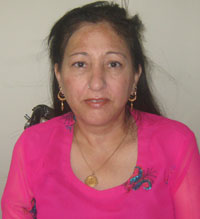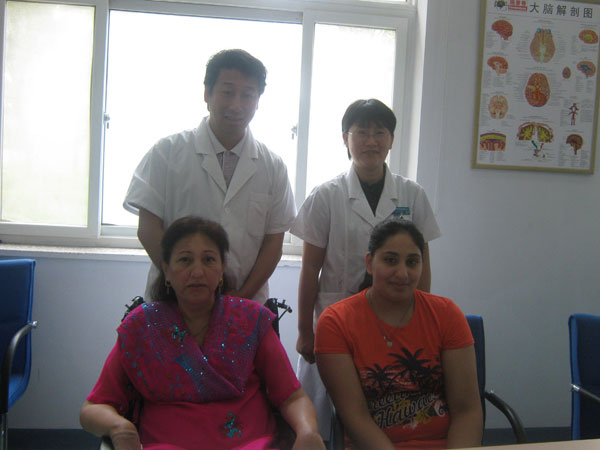Shahida Khan-Amyotrophic lateral sclerosis(England) Posted on July 6, 2010
Name: Shahida Khan 
Sex: Female
Country: England
Age: 46
Diagnoses: (ALS) Amyotrophic lateral sclerosis
Admission Date: 2010-06-06
Days Admitted to the Hospital: 24
Shahida began feeling pain in the extremities of her left arm and was not sure what the cause was. It wasn't long after that when she began feeling weakness in the left hand. Six months later, she developed weakness and muscle atrophy in both hands accompanied with muscle atrophy. Eventually the weakness extended to her legs as well, making it difficult and uncomfortable for Shahida to walk. Her condition became more serious in September of 2007. Her symptoms then included dyskinesia in both arms, making it difficult to take care of herself. However, she was able to walk and get herself to the local hospital for treatment. She received a CT examination of the chest, abdomen and pelvis. She also received an MRI of the head, EMG and a comprehensive blood test. The results showed a malignant tumor, blood disease, rheumatism and immune disease. The EMG showed a severe acute chronic denervation change. Her legs were normal, but the MRI of the head showed white matter degenerative changes. Shahida was diagnosed with ALS and was put on medications such as riluzole. Despite the physical rehabilitation training she received, there wasn't much improvement and her condition continued to gradually worsen. About one year ago, Shahida had an accidental fall and after this incident, her walking ability decreased. The weakness in all four limbs was severe for the next 5 months. Eventually Shahida was unable to stand or walk. At this time, she developed difficulty with her speech and her memory was impaired. Shahida was unable to care for herself and was utterly dependent on others.
After exhausting all other options for treatment, Shahida and her family learned about Wu Stem Cells Medical Center and what could potentially be done for her ALS. After consulting with our doctors, the decision was made to come here for treatment.
When Shahida was first admitted to our medical center, she was alert but depressed. During her examination it was found that her memory, calculation abilities and orientation were normal. The tongue could only extend out as far as the teeth. There was atrophy in the lingualis muscle. The lingualis muscle could not move flexibly and was unable to reach the isthmus or palate. The cheek muscles were weak as well as the soft palate. Shahida was too weak to cough. She was unable to turn her body or shrug her shoulders. There was obvious muscle atrophy in all four limbs and throughout the body. The atrophy was more severe in the bilateral scapular, both upper limbs, the thenar of both hands, and the proximal lower limbs. The adduction muscle strength of both upper limbs was level 2, and the upper limbs were unable to abduct. The muscle strength of both lower limbs was level 3. The muscle tone of both upper limbs was slightly low. The muscle tone of both lower limbs was almost normal. The tendon reflexes of both upper limbs were weakened; the tendon reflexes of both lower limbs were active. Bilateral ankle clonus was positive; the abdominal reflex was not elicited. The bilateral Hoffmann's sign was positive, and the bilateral Babinski's sign was negative. Both of her feet sagged. Shahida had normal sensitivity to pain. She could not successfully perform the finger-to-nose test, digital opposition test, rapid rotation test or the heel-to-knee-to-shin test. There were no signs of meningeal irritation.
We initially gave Shahida a complete examination and she was diagnosed with amyotrophic lateral sclerosis, type 2 diabetes mellitus, bronchial asthma and fatty liver (moderate-severe case), HHCY-hyperhomocysteinemia. During the treatment we proceeded with the self stem cells activation treatment to repair the damage to the neurons. Shahida also received treatment to improve the blood circulation in order to increase the blood supply to the damaged neurons and to nourish them. Shahida was given daily physical rehabilitation training to promote the recovery of her motor functioning.
After the treatment was completed, Shahida's pain was not as severe and the burning sensation in both feet had almost disappeared. Her quality of sleep has improved. Shahida can now turn over from her side to her back while lying in bed. The swallowing difficulty has decreased. The breathing difficulty has decreased while she is in a sitting position. The bilateral thoracic expansion has increased; the respiration of both lungs is now strong. Shahida can stand up more easily with someone's assistance. Shahida's posture is better while she is standing and she can straighten both knees. Her blood pressure and blood sugar levels are stable.
A week after Shahida was discharged from our hospital, her daughter wrote to Wu Stem Cells Medical Center: "Hi Julia! Hope you are okay, I miss you too and yeah mum is doing well, her drinking ability has improved, she can drink fluids normally now. Thanks for everything and I hope everything is ok with you!
Zaki"
See Shahida's vedio:
(Download the Windows Media Player Firefox Plugin if you are using Firefox browser.
To know more,Please read Using the Windows Media Player plugin with Firefox.)

